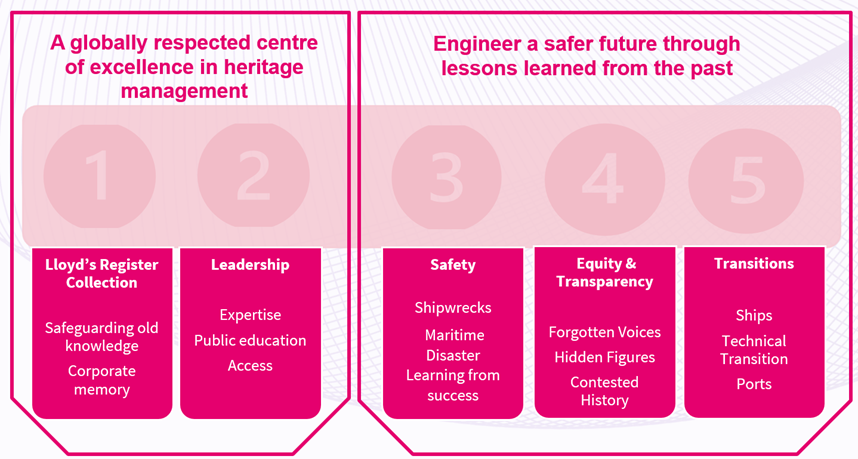Our maritime heritage plays a crucial role in supporting the Lloyd’s Register Foundation's mission to engineer a safer world. Over the next four years, we are leveraging our Heritage Centre's expertise to amplify the Foundation’s impact across three interconnected priority areas: Safer Maritime Systems, Skilled People for Safer Engineering, and Safer Sustainable Infrastructure.
Our extensive heritage collections, comprising over 1.1 million documents, chronicle the construction, maintenance, and evolution of ships and maritime trade since the 1830s. These specialist collections are freely accessible both online and in-person at the Lloyd’s Register Building in London. Our heritage team collaborates with a diverse array of global partners to unlock the value of this archive, promoting a 'Learning From the Past' approach to maritime safety, technical transitions, equity, and transparency. By uncovering historical insights, we can enhance our understanding of the challenges facing the maritime sector, both past and present, and contribute to building a safer, more sustainable, and resilient ocean economy for future generations.
Within this rich heritage scope, the following Heritage Key Themes provide a clear framework to guide the work priorities and practices of the Heritage Centre in alignment with the Lloyd’s Register Foundation strategy.

-
Theme 1: Lloyd’s Register Collection - Safeguarding Old Knowledge, and Corporate Memory
Comprehensive Collecting by Heritage Centre will enable us to continuously expand and maintain a collection that encompasses all facets of maritime history from 1760 to the present. This includes ships and shipbuilding, navigation, trade routes, cultural exchanges, technology and innovation, social impacts, maritime law, and safety, all relevant to the work of Lloyd’s Register (LR) and the Foundation.
We are also Safeguarding Knowledge as we preserve and collect historical knowledge to facilitate learning from the past, integrating this knowledge into the collections and resources offered by the Heritage Centre.
In this way we secure and ensure the long-term future of the LR corporate archives. Systematically and consistently capture data and insights from LR and Foundation activities for future use.
Find out more about Theme 1
-
Theme 2: Leadership - Expertise, Public Education, Access
The Heritage Centre aims to inspire learning, innovation, and collaboration by utilising its collections and expertise. Our knowledgeable staff are specialising in archival, curatorial, and library management, maritime history, and heritage interpretation. We develop thought leadership through partnerships, published research, and active participation in global heritage discourse.
Supporting International Maritime History, our Heritage centre seek opportunities to further collaboration in this space emphasising the value of historical collections to broader audiences. Our work is underpinned by localisation and internationalism: respecting the unique heritage of local maritime communities while highlighting their connections to global maritime networks.
Find out more about Theme 2
-
Theme 3: Safety – Shipwrecks and Maritime Disaster
Maritime disasters continue to pose significant risks to human life, the environment, and global trade. Hazardous shipwrecks leak pollutants into delicate marine ecosystems, while historic safety failures—such as inadequate evacuation procedures or insufficient weather preparation—continue to inform modern challenges. Despite the wealth of data on individual shipwreck incidents, there is no comprehensive platform to study their patterns, analyse root causes, or provide accessible insights for future prevention. This initiative seeks to address this gap through research, collecting, and public engagement on maritime disasters and their consequences.
We seek to explore establishing a Centre of Excellence focused on the study, documentation, and public engagement regarding shipwrecks, maritime disasters, and the environmental and safety challenges they present from 1760 to the present day. This initiative aligns directly with the Foundation’s mission to promote safety and sustainability in the maritime industry, addressing critical historical and contemporary issues such as hazardous and polluting wrecks, evolving safety standards, and environmental threats.
Find out more about Theme 3
-
Theme 4: Equity & Transparency – Forgotten Voices and Hidden Figures
This theme supports the Heritage Centre's initiative to study, document, learn from and exhibit the stories of underrepresented individuals in the maritime industry. Traditionally, male-dominated, ‘hero-driven’ narratives have often overshadowed or overlooked important minorities. From the 1760s to the present day, women, indigenous peoples, and minority workforces have played under-recognised roles in seafaring, fishing, shipbuilding, port operations, and governance.
This initiative aligns with the Foundation’s mission to promote safety and sustainability in the maritime industry, addressing historical inequalities, amplifying the contributions of hidden figures, and fostering gender equity as a cornerstone of a modern and inclusive maritime workforce.
Find out more about Theme 4
-
Theme 5: Transitions – Ships, Ports and Technical Transition
The ship is a crucial unit of analysis for the Foundation, especially regarding safety. This theme supports a program that investigates the ship as the fundamental unit for understanding historical technological transitions and their impact on maritime safety, efficiency, and sustainability. By examining the ship's lifecycle—from design and construction to operation, regulation, repair, and decommissioning—this initiative will analyse how key innovations in shipbuilding, materials, and regulatory practices have influenced maritime safety and operational performance from the 1760s to the present day.
The ship serves as a tangible and practical focal point for exploring the relationship between technological advancements and industry practices. By studying individual ships and their contexts, the program will reveal how design evolution, material choices, and regulatory frameworks have impacted maritime risk management, environmental sustainability, and global trade networks. This ship-centred approach directly supports the Foundation’s mission to enhance safety and efficiency in the maritime sector while addressing emerging challenges in a rapidly evolving industry.
Find out more about Theme 5

